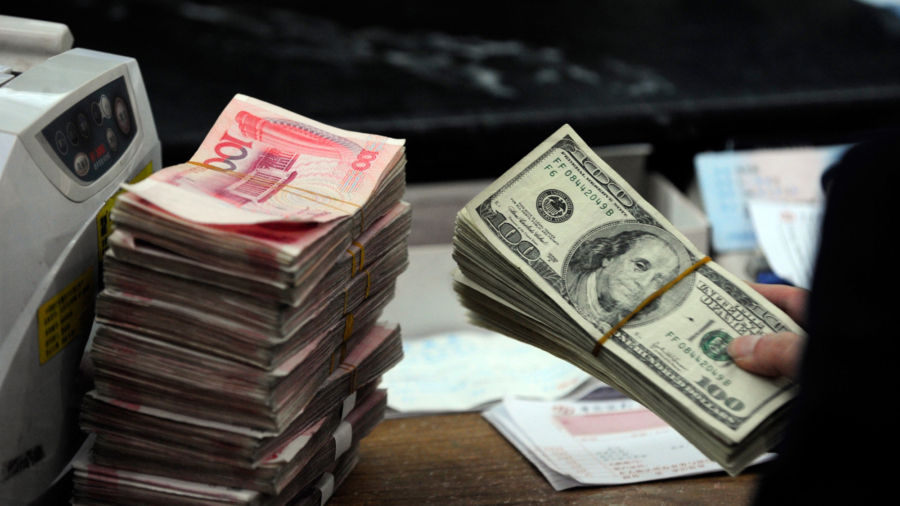The U.S. government has determined that China is manipulating its currency and will engage with the International Monetary Fund to eliminate unfair competition from Beijing, U.S. Treasury Secretary Steven Mnuchin said in a statement on Monday, Aug. 5.

The move brings already tense U.S.-Chinese relations to a boil and fulfills President Donald Trump’s promise to label China a currency manipulator for the first time since 1994.
The U.S. action follows China allowing its yuan to weaken past the key 7-per-dollar level on Aug. 5 for the first time in more than a decade. The last time the yuan dropped to this rate was on Aug. 14, 2008, when it hit 7.0. Since then, the rate has fluctuated, hovering between 6.2 to 6.9 per dollar.
After the currency devaluation, Beijing said it would stop buying U.S. agricultural products, inflaming a yearlong trade war with the United States.
The sharp 1.4 percent drop in the yuan comes days after Trump stunned financial markets by vowing to impose 10 percent tariffs on the remaining $300 billion of Chinese imports from Sept. 1, abruptly breaking a brief ceasefire in a bruising trade war that has disrupted global supply chains and slowed growth.
The news knocked the dollar sharply lower and bolstered the price of gold.
The Treasury Department said a statement from the People’s Bank of China (PBOC) on Aug. 5 made clear that Chinese authorities had ample control over the yuan exchange rate.
The PBOC said Aug. 5 it would “continue to … take necessary and targeted measures against the positive feedback behavior that may occur in the foreign exchange market.”
“This is an open acknowledgment by the PBOC that it has extensive experience manipulating its currency and remains prepared to do so on an ongoing basis,” the Treasury statement said.
It said China’s actions violate its commitment to refrain from competitive devaluation as part of the Group of 20 industrialized countries. Treasury said it expected China to adhere to those commitments and not target China’s exchange rate for competitive purposes.
U.S. law sets out three criteria for identifying manipulation among major trading partners: a material global current account surplus, a significant bilateral trade surplus with the United States, and persistent one-way intervention in foreign exchange markets.
After determining a country is a manipulator, the Treasury is required to demand special talks aimed at correcting an undervalued currency, with penalties such as exclusion from U.S. government procurement contracts.
The U.S. Treasury had designated Taiwan and South Korea as currency manipulators in 1988, the year that Congress enacted the currency review law. China was the last country to get the designation, in 1994.
In May, the Treasury had refrained from declaring China a currency manipulator based on new tougher criteria measuring a country’s global current account surplus, along with persistent one-way intervention and a large bilateral trade surplus with the United States.
In the report, however, Treasury kept China on an enhanced monitoring list due to a “misalignment and undervaluation of the RMB relative to the dollar.”
Reactions
Trump reacted to the news on Twitter: “China dropped the price of their currency to an almost historic low. It’s called ‘currency manipulation.’ Are you listening Federal Reserve? This is a major violation which will greatly weaken China over time!”
Chinese state-run media Xinhua on Aug. 5 quoted Yi Gang, the governor of China’s central bank, as saying that the exchange rate had naturally devalued due to market forces.
He addressed the accusations of currency manipulation, saying, “The [Chinese regime] does not engage in competitive devaluation of the currency, doesn’t use the exchange rate for competitive purposes, and would not use the exchange rate as a tool to deal with external disturbances such as trade disputes.”
Frank Tian Xie, professor of business at the University of South Carolina-Aiken, concluded that Beijing likely determined the exchange rate, “but, on the other hand, the market pressure is affecting it as well,” he told The Epoch Times on Aug. 5.
The devalued currency brings two direct effects to the Chinese economy, he explained. On one hand, it can bring positive impacts, as a cheaper currency can make all Chinese products cheaper in the global market, while offsetting the costs of paying tariffs on goods exported to the United States.
The other consequence would be negative because foreign investors and wealthy Chinese elites will likely transfer their capital out of China in order to maintain the value of their assets.
As the Chinese economy is in the midst of an overall severe downturn, Xie said Beijing may have chosen to devalue its currency because it has “no better solution” to its woes.
The Chinese regime has previously used stimulus policies to keep its economy from slowing down. But that has proven problematic. “They simply printed too much money [to maintain the economy’s growth rate] over the years, creating a huge inflation that caused the value of the yuan to go down the drain,” Xie said.
He also predicted that Beijing would want to use the cheaper yuan to create a trade surplus with the United States, but “as a result, the Trump administration may punish China by increasing tariffs on the $300 billion Chinese goods from 10 to 25 percent very soon,” Xie said.
Xie surmised that the high inflation coupled with capital outflow will further weaken the yuan, and promote a vicious cycle of more capital outflow. “The shift of the [manufacturing] supply chain from China to Southeast Asia would accelerate at a larger scale,” he added. Many foreign manufacturers have moved production out of China in recent months in order to avoid paying tariffs on goods destined for the U.S. market.
“The Chinese economy will be weakened further and unemployment will shoot up even more. This could threaten the political stability of the Chinese regime,” he said.
Epoch Times reporter Nicole Hao and Reuters contributed to this report.

